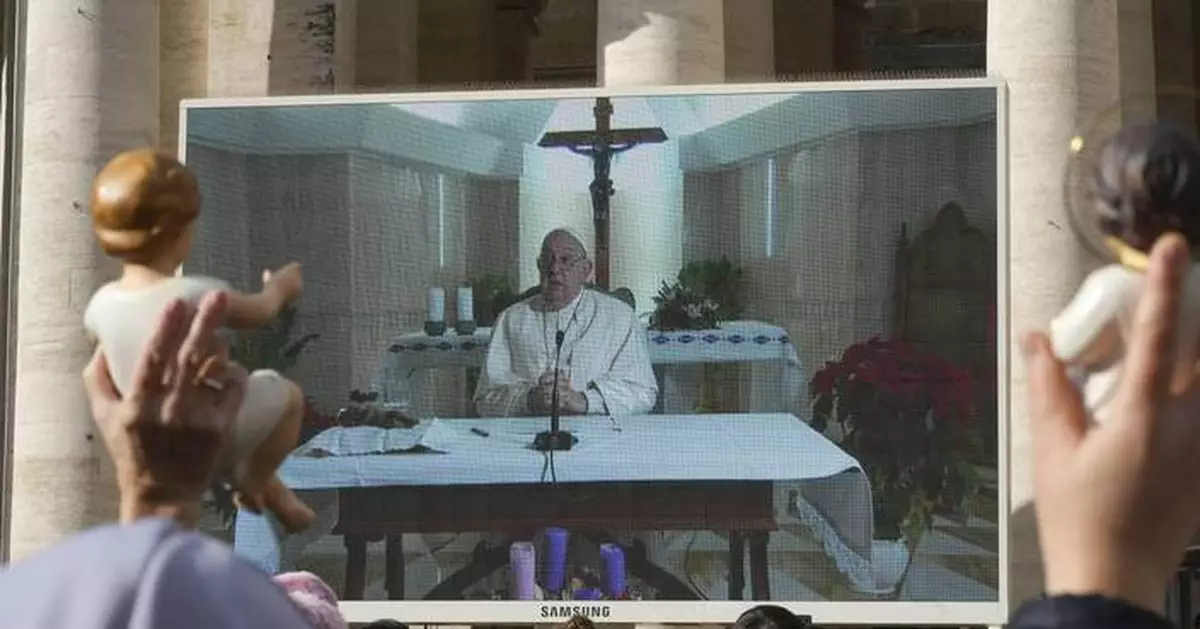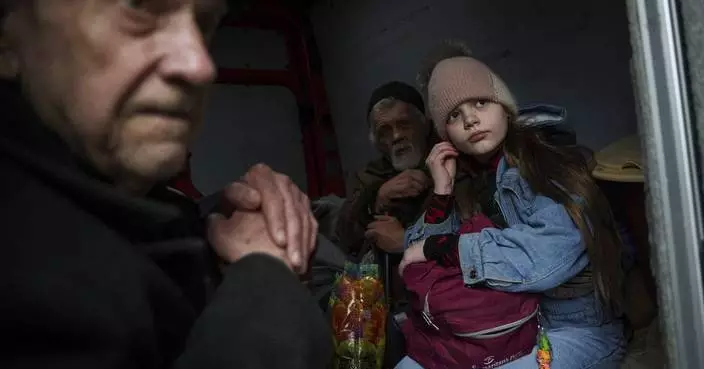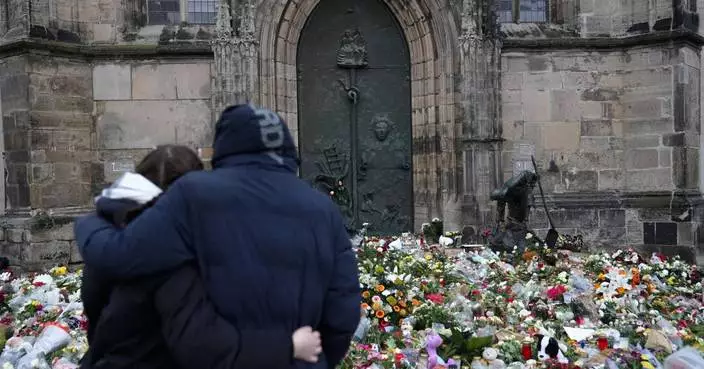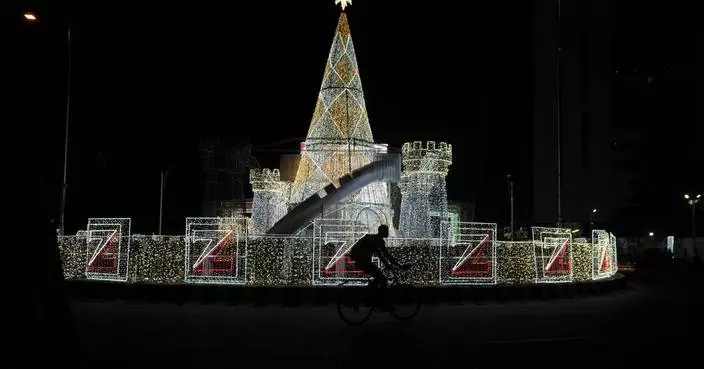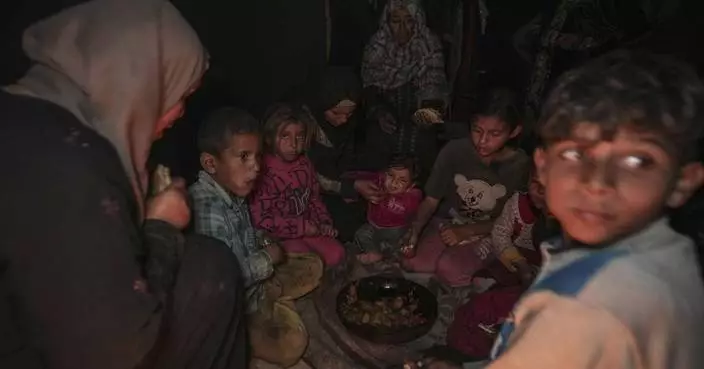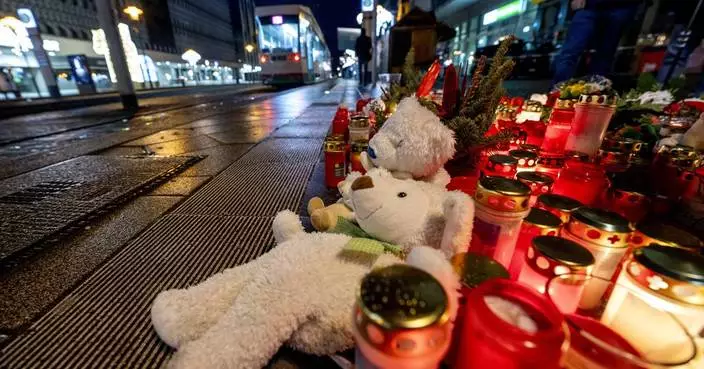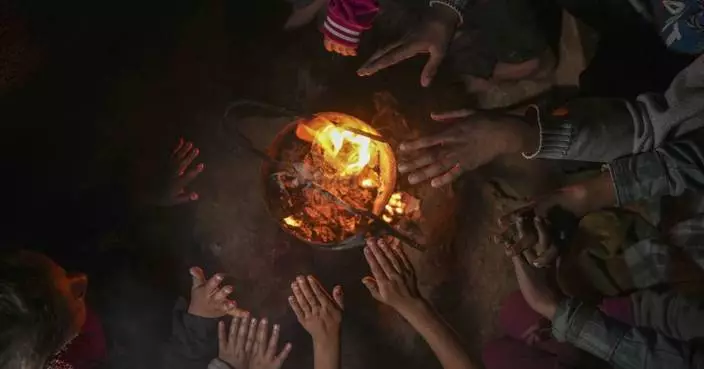VATICAN CITY (AP) — Pope Francis called for a ceasefire on all war fronts in his Sunday Angelus prayer ahead of Christmas, condemning the “cruelty” of bombing schools and hospitals in Ukraine and Gaza.
“Let the weapons fall silent and let the Christmas carols ring out!” Francis said, delivering his Sunday blessing from indoors due to a cold and as a precaution ahead of a busy Christmas period.
Click to Gallery
Carabinieri police officers patrol as people look at giant screens in St.Peter's Square showing Pope Francis reciting the Angelus noon prayer from his Santa Marta Residence, after he decided not to appear at the window of his studio overlooking the square because of a persistent cold, at the Vatican, Sunday, Dec. 22, 2024. (AP Photo/Andrew Medichini)
People hold statuettes of baby Jesus as they look at a giant screen in St.Peter's Square, at the Vatican, showing Pope Francis reciting the Angelus noon prayer from his Santa Marta Residence, after he decided not to appear at the window of his studio overlooking the square because of a persistent cold, Sunday, Dec. 22, 2024. (AP Photo/Andrew Medichini)
People look at a giant screen in St.Peter's Square, at the Vatican, showing Pope Francis reciting the Angelus noon prayer from his Santa Marta Residence, after he decided not to appear at the window of his studio overlooking the square because of a persistent cold, Sunday, Dec. 22, 2024. (AP Photo/Andrew Medichini)
People look at a giant screen in St.Peter's Square, at the Vatican, showing Pope Francis reciting the Angelus noon prayer from his Santa Marta Residence, after he decided not to appear at the window of his studio overlooking the square because of a persistent cold, Sunday, Dec. 22, 2024. (AP Photo/Andrew Medichini)
People hold statuettes of baby Jesus as they look at a giant screen in St.Peter's Square, at the Vatican, showing Pope Francis reciting the Angelus noon prayer from his Santa Marta Residence, after he decided not to appear at the window of his studio overlooking the square because of a persistent cold, Sunday, Dec. 22, 2024. (AP Photo/Andrew Medichini)
“Let us pray that at Christmas there will be a ceasefire on all war fronts, in Ukraine, in the Holy Land, throughout the Middle East and throughout the world,” the pope said.
Francis recalled, as he often does, the “battered Ukraine” that continues to be hit by attacks on cities, “which sometimes damage schools, hospitals and churches.”
He also expressed his pain thinking of Gaza, “of such cruelty, to the machine-gunning of children, to the bombing of schools and hospitals ... How much cruelty!”
Francis on Saturday also criticized Israel’s actions in Gaza and said that his envoy had been unable to enter the territory because of Israeli bombing. Israeli authorities on Sunday allowed Cardinal Pierbattista Pizzaballa, the leader of the Catholic Church in the Holy Land, to enter Gaza and celebrate a pre-Christmas Mass with members of the territory’s small Christian community.
Israel says it has made great efforts to spare civilians and is only at war with Hamas, which it accuses of genocidal violence in the attack that ignited the war.
The pontiff, who turned 88 this past week, appeared in good shape on Sunday, after looking wheezing and congested during his annual Christmas greeting to Vatican bureaucrats on Saturday.
The Vatican cited the cold temperatures outside and Francis’ strenuous week ahead in deciding to deliver his Sunday blessing indoors.
The pope on Tuesday is due to inaugurate his big Holy Year and preside over Christmas Eve and Christmas Day celebrations in St. Peter’s Basilica. On Thursday, he is scheduled to travel to Rome’s main prison to inaugurate the Jubilee there.
Francis has long suffered bouts of bronchitis, especially in winter. In 2023, he ended up in hospital to receive intravenous antibiotics. He had part of one lung removed as a young man and frequently seems out of breath, especially after walking or exerting himself.
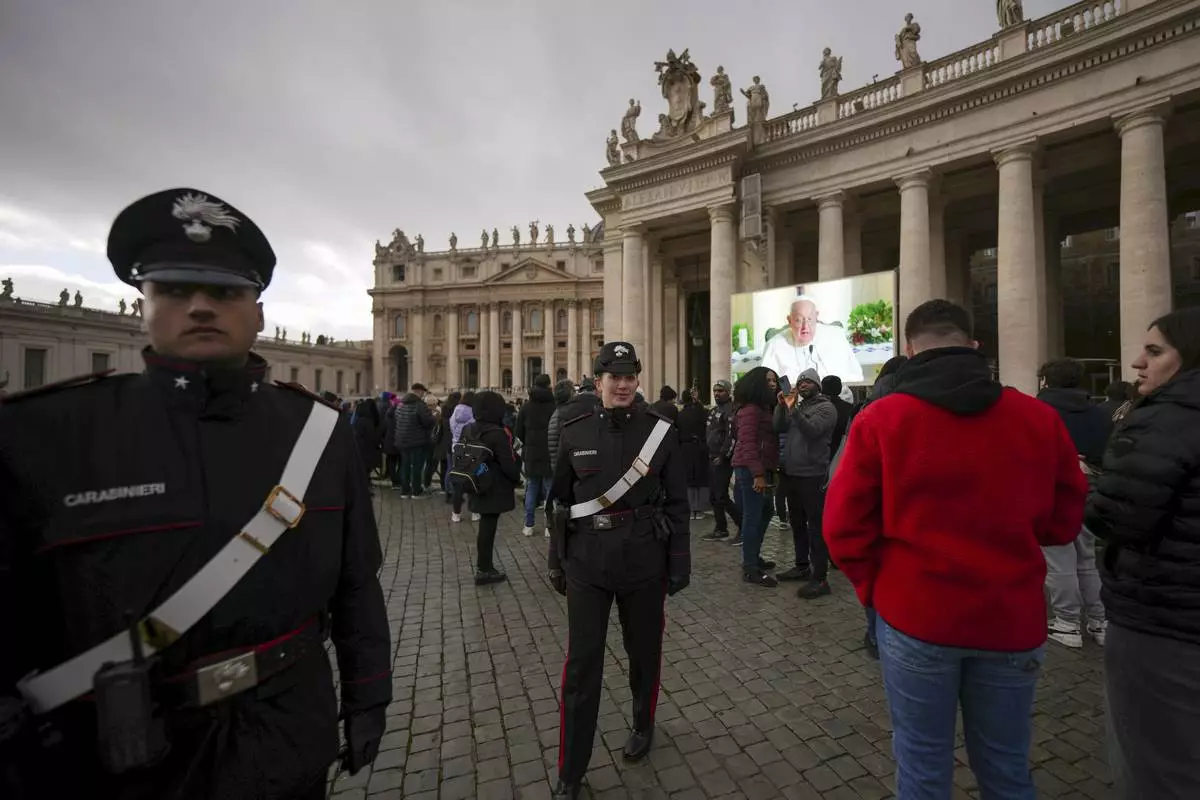
Carabinieri police officers patrol as people look at giant screens in St.Peter's Square showing Pope Francis reciting the Angelus noon prayer from his Santa Marta Residence, after he decided not to appear at the window of his studio overlooking the square because of a persistent cold, at the Vatican, Sunday, Dec. 22, 2024. (AP Photo/Andrew Medichini)
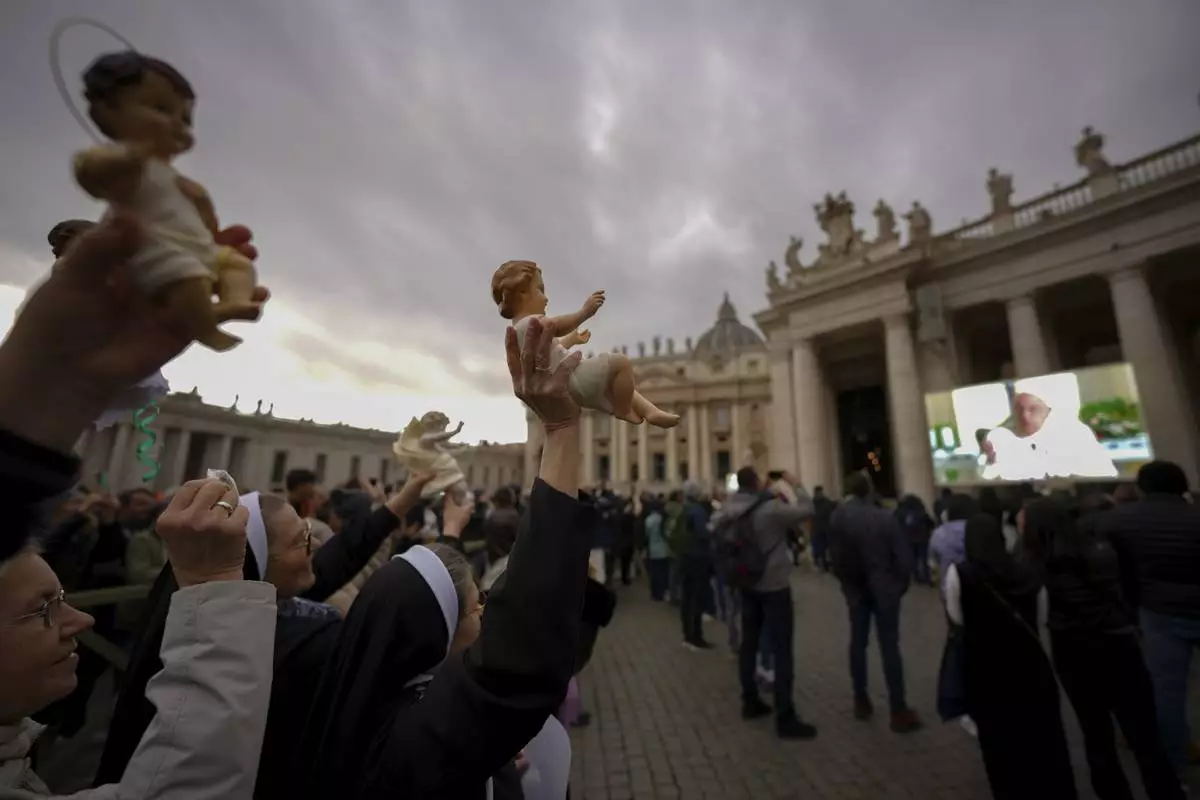
People hold statuettes of baby Jesus as they look at a giant screen in St.Peter's Square, at the Vatican, showing Pope Francis reciting the Angelus noon prayer from his Santa Marta Residence, after he decided not to appear at the window of his studio overlooking the square because of a persistent cold, Sunday, Dec. 22, 2024. (AP Photo/Andrew Medichini)
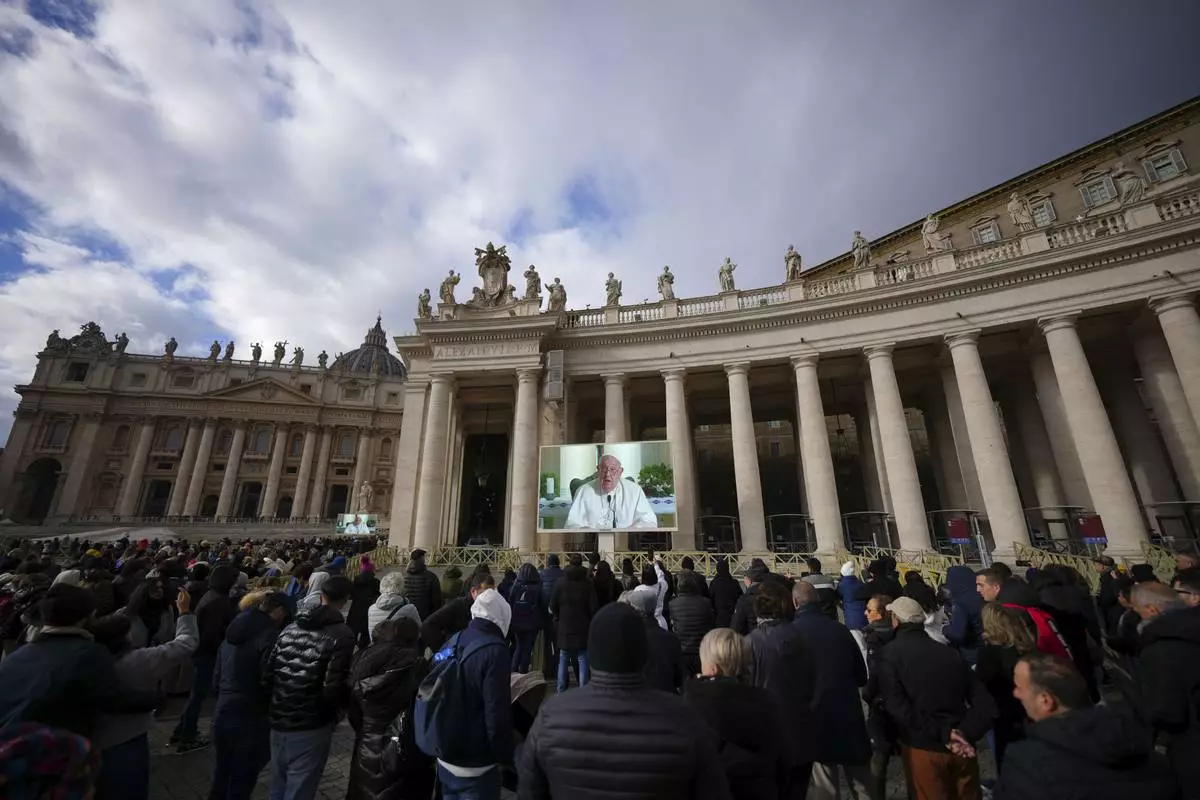
People look at a giant screen in St.Peter's Square, at the Vatican, showing Pope Francis reciting the Angelus noon prayer from his Santa Marta Residence, after he decided not to appear at the window of his studio overlooking the square because of a persistent cold, Sunday, Dec. 22, 2024. (AP Photo/Andrew Medichini)
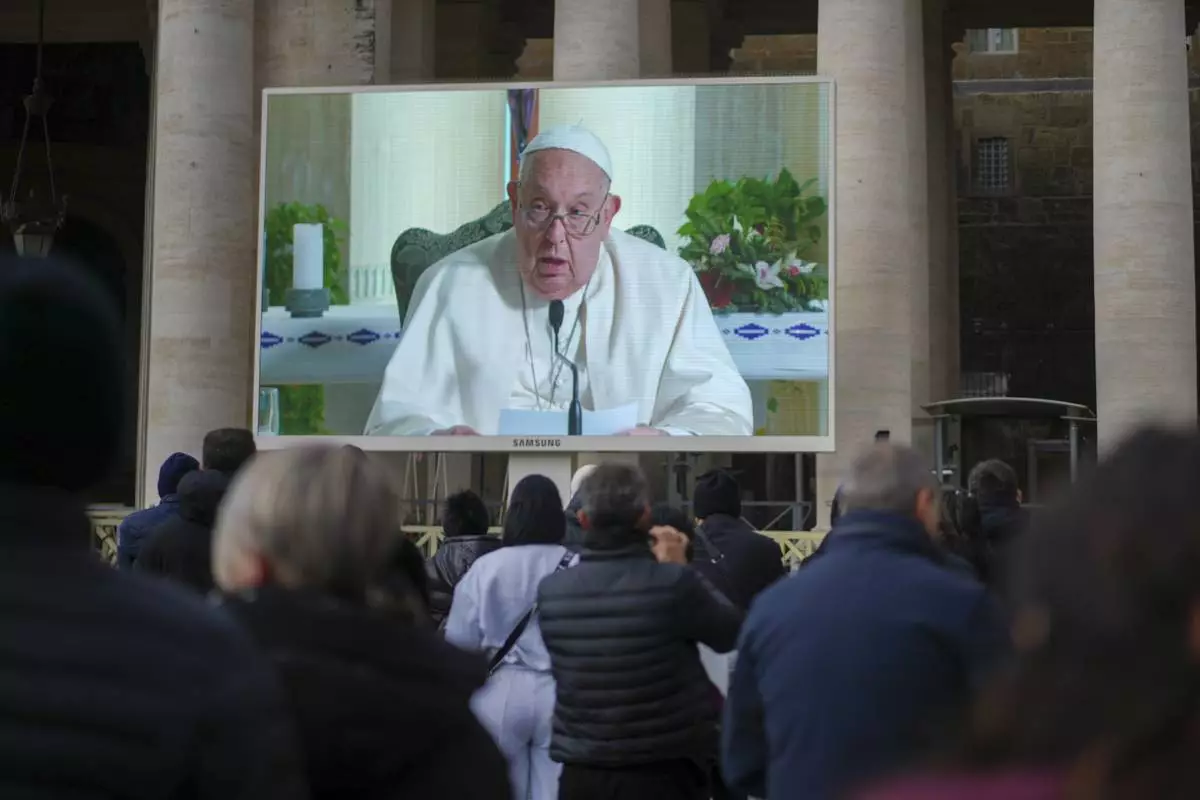
People look at a giant screen in St.Peter's Square, at the Vatican, showing Pope Francis reciting the Angelus noon prayer from his Santa Marta Residence, after he decided not to appear at the window of his studio overlooking the square because of a persistent cold, Sunday, Dec. 22, 2024. (AP Photo/Andrew Medichini)
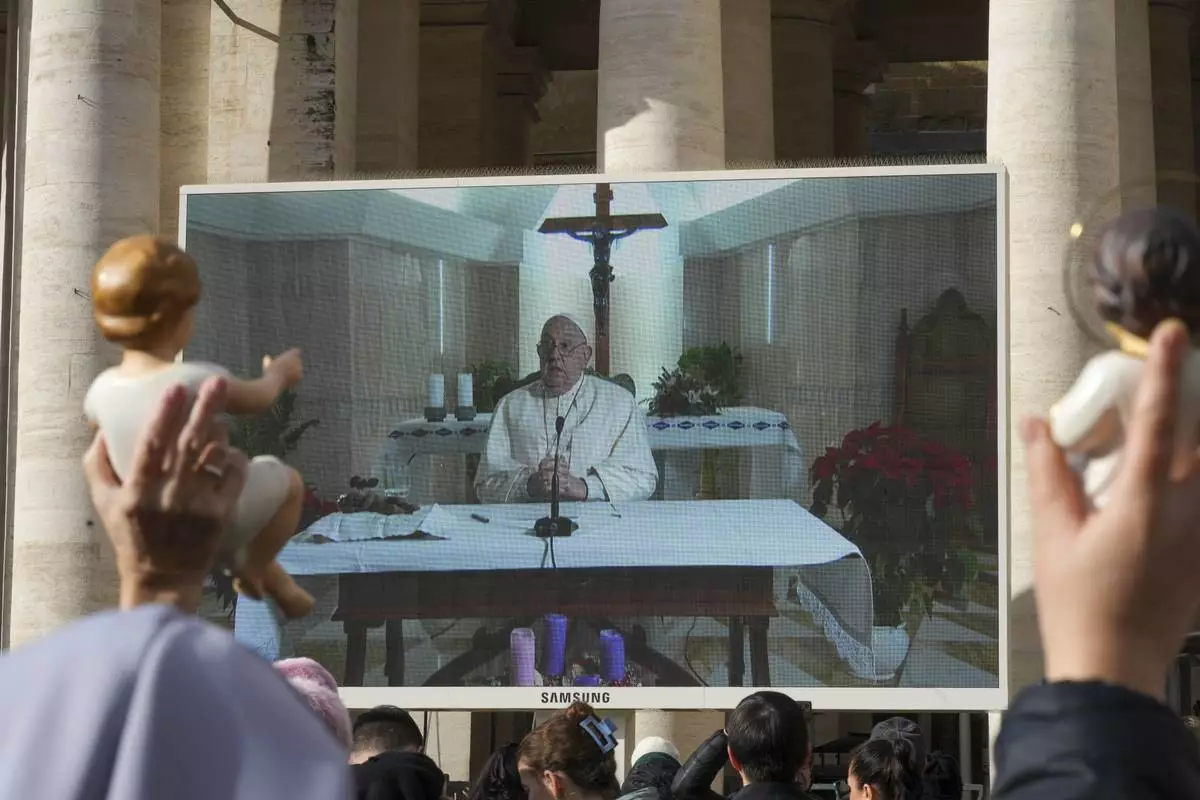
People hold statuettes of baby Jesus as they look at a giant screen in St.Peter's Square, at the Vatican, showing Pope Francis reciting the Angelus noon prayer from his Santa Marta Residence, after he decided not to appear at the window of his studio overlooking the square because of a persistent cold, Sunday, Dec. 22, 2024. (AP Photo/Andrew Medichini)
MAMOUDZOU, Mayotte (AP) — Cyclone Chido not only ravaged Mayotte’s fragile infrastructure but also laid bare deep-seated tensions between the island’s residents and its large migrant population.
Thousands of people who have entered the island illegally bore the brunt of the storm that tore through the Indian Ocean archipelago. Authorities in Mayotte, France's poorest territory, said many avoided emergency shelters out of fear of deportation, leaving them, and the shantytowns they live in, even more vulnerable to the cyclone’s devastation.
Still, some frustrated legal residents have accused the government of channeling scarce resources to migrants at their expense.
“I can’t take it anymore. Just to have water is complicated,” said Fatima on Saturday, a 46-year-old mother of five whose family has struggled to find clean water since the storm.
Fatima, who only gave her first name because her family is known locally, added that “the island can’t support the people living in it, let alone allow more to come.”
Mayotte, a French department located between Madagascar and mainland Africa, has a population of 320,000, including an estimated 100,000 migrants, most of whom have arrived from the nearby Comoros Islands, just 70 kilometers (43 miles) away.
The archipelago's fragile public services, designed for a much smaller population, have been overwhelmed.
“The problems of Mayotte cannot be solved without addressing illegal immigration,” French President Emmanuel Macron said during his visit this week, acknowledging the challenges posed by the island’s rapid population growth,
“Despite the state’s investments, migratory pressure has made everything explode,” he added.
The cyclone further exacerbated the island’s issues after destroying homes, schools, and infrastructure.
Though the official death toll remains 35, authorities say that any estimates are likely major undercounts, with hundreds and possibly thousands feared dead. Meanwhile, the number of seriously injured has risen to 78.
The migrants' shantytowns, known as "bangas," have long been an issue in Mayotte.
“Can we solve the issue of shantytowns today? The answer is no. We will address it during the stabilization and rebuilding phase,” Macron said.
Most migrants have family links in Mayotte and speak the same language. They seek a better life on the island rather than aiming to reach the European continent.
For many like Nazca Antoiy, a Comorian who has lived in Mayotte for a decade, the cyclone has stoked fears of displacement.
“I heard that people were told not to reconstruct new houses. So we need to worry about that,” she said.
These fears are not unfounded. Last year, France launched Operation Wuambushu, a controversial campaign to demolish shantytowns and deport undocumented migrants. Macron hinted that similar policies could resume but stressed reconstruction efforts would take precedence.
Mayotte’s geopolitical position has long made it a hotspot for migration. While the island voted to remain French in referendums held in 1974 and 1976, neighboring Comoros has never recognized its sovereignty and continues to claim the archipelago as its own. This unresolved dispute has fueled waves of migration, with thousands risking perilous sea crossings each year.
Outgoing French Interior Minister Bruno Retailleau recently reignited the debate, describing the situation in Mayotte as a “war,” earlier this week. Retailleau proposed stricter measures, including using drones and naval patrols to block further arrivals. “We must be much tougher on the Comoros,” he said, accusing the neighboring government of allowing migrants to leave its shores unchecked.
Retailleau’s calls to “change the rules” include proposals to restrict birthright citizenship in Mayotte, a policy already tightened in 2018 to require proof that at least one parent had been a legal resident for more than three months. Critics argue that these measures only deepen Mayotte’s divisions without addressing the root causes of migration.
A 2023 parliamentary report cited in French media warned that the island was a “ticking time bomb" while suggesting redistributing part of Mayotte’s migrant population to mainland France — a proposal unlikely to gain widespread support.
Adamson reported from Paris
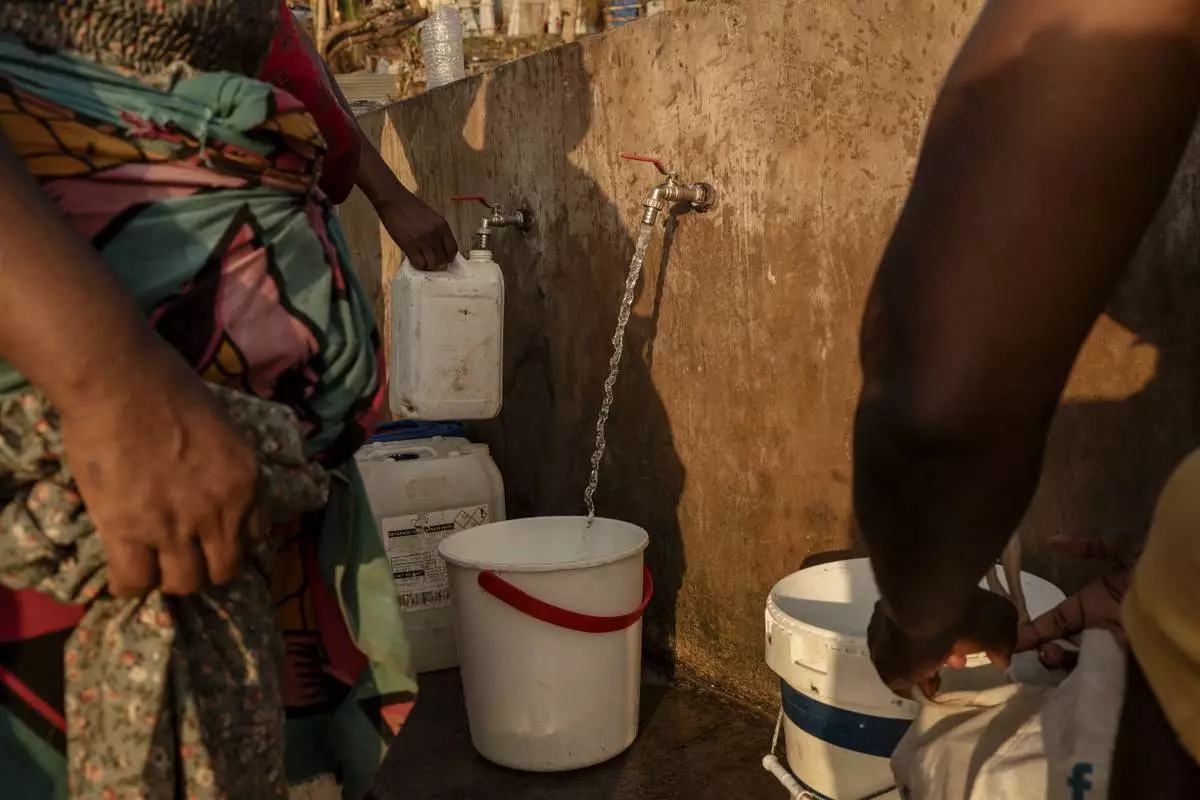
People line up to collect water in Barakani, Mayotte, home Saturday, Dec. 21, 2024. (AP Photo/Adrienne Surprenant)
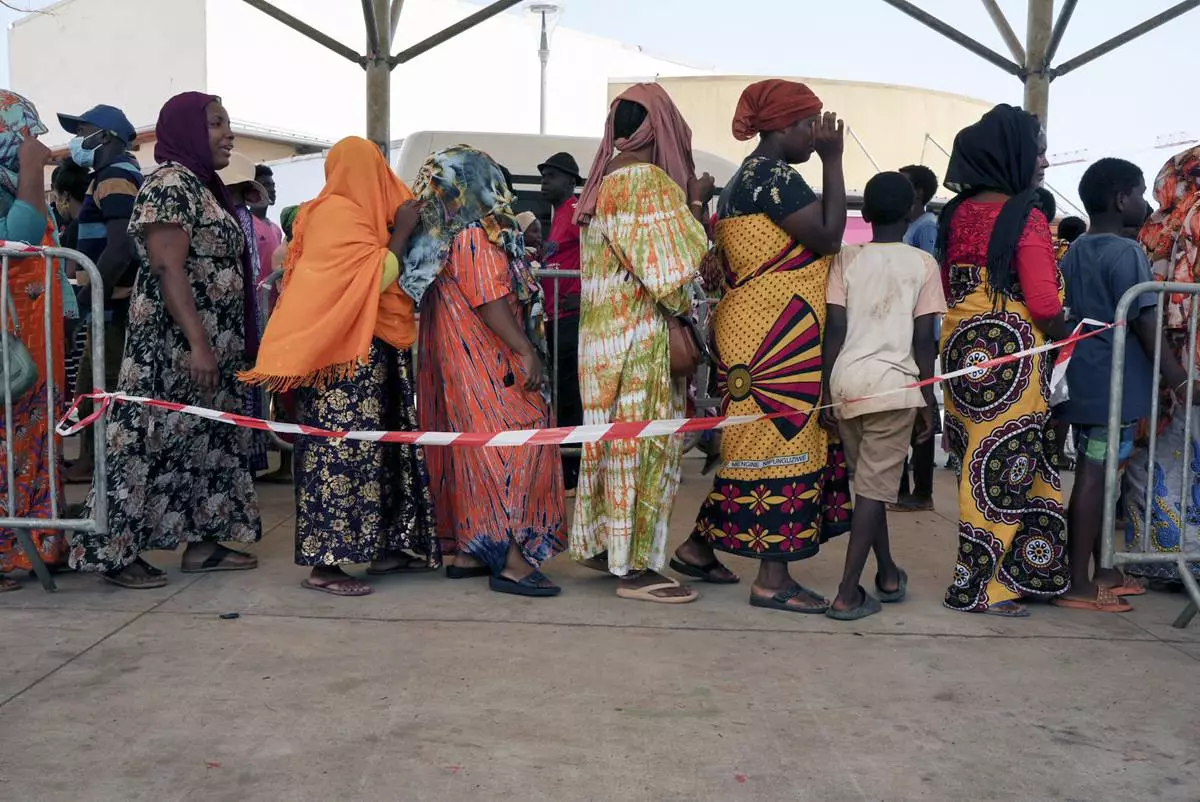
Women wait in line at a water distribution point in Mamoudzou, Mayotte, Saturday, Dec. 21, 2024. (AP Photo/Adrienne Surprenant)







